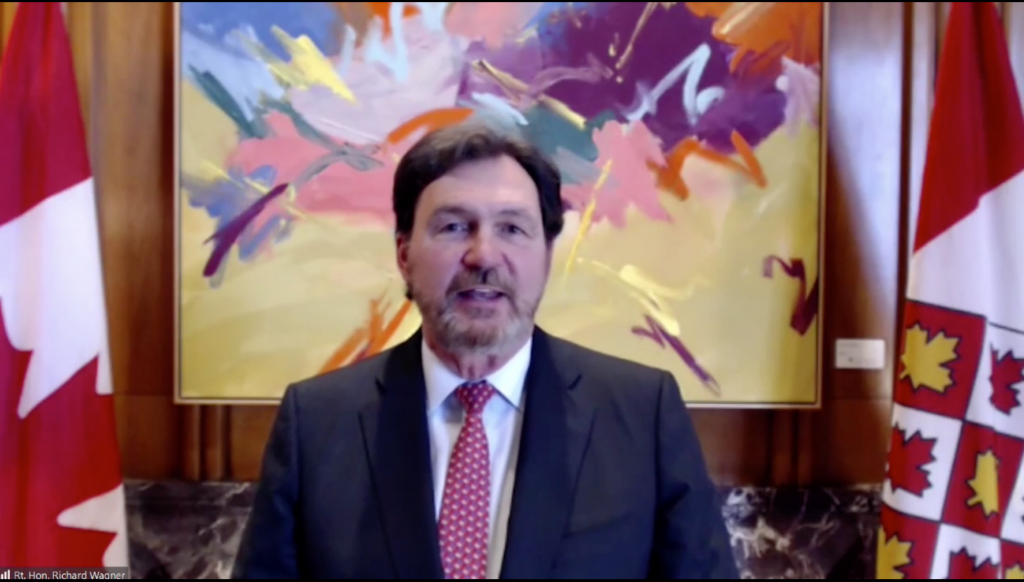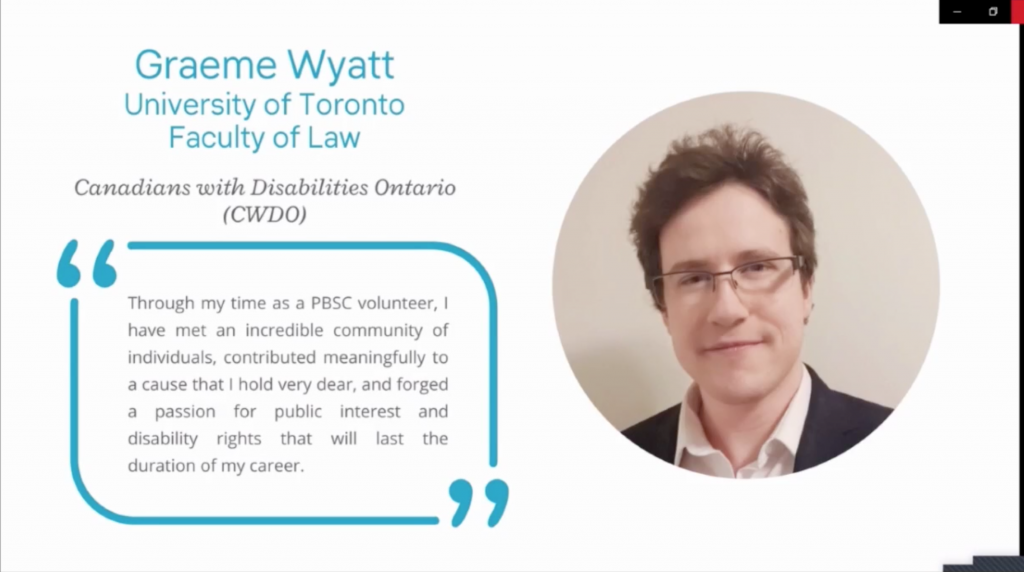First year law student Graeme Wyatt received the award for the University of Toronto’s Pro Bono Students Canada chapter
On Friday March 26, the Pro Bono Students Canada (PBSC) program presented the second annual Chief Justice Richard Wagner Awards and first National Volunteer Appreciation Event. The virtual event was hosted by PBSC’s national law firm partner, McCarthy Tétrault LLP.
Founded in 1996 at the University of Toronto, PBSC recruits over 1500 law student volunteers to provide free high-quality legal services to over 400 organizations, courts, and tribunals across the country.
The Chief Justice Richard Wagner Awards were introduced last year to honour the Right Honourable Richard Wagner and his long standing commitment to access to justice. The awards recognize an outstanding volunteer from each of the 22 PBSC chapters across Canada.
PBSC’s National Director Brittany Twiss opened the event by acknowledging the difficulty of this past year, noting the recent rise of anti-Asian rhetoric as well as continued xenophobia and white supremacy which affect many PBSC members and the communities they serve.
“At PBSC, we believe that as a community of current and future legal professionals, we must constantly build our understanding of intersectionality and equity, and reflect on the privileges we hold,” said Twiss. “We also believe that our privileges come with great responsibility to take action for justice and to ensure the colonial legal system is acceptable to and actually work for all, and that Indigenous legal orders are respected. Inherent in this is a commitment to approaching our work with humility.”
Dave Leonard, CEO of McCarthy Tétrault, echoed Twiss’ sentiments, thanking students for their work increasing access to justice in their local communities for the most vulnerable of Canadians. “We may all be in the middle of the same storm, but we are not all in the same boat riding out that storm. There are many people in our communities who need help.”

Chief Justice Wagner launched into a discussion of the importance of pro bono work in the legal profession. He addressed the student volunteers, saying, “you have lived up to your organizational values of dignity, equity, and humility. I share those values. How can you meet the needs of the marginalized people in our country if you don’t listen and learn from their lived experiences? You are at the forefront of demonstrating that law can be a caring profession and a noble calling.”
The Chief Justice then discussed how the justice system was not prepared for the COVID-19 pandemic and how he and the Court quickly learned the importance of leveraging technology and embracing change. He emphasized that while the pandemic has worsened pre-existing problems like intimate partner violence and introduced immediate legal issues for healthcare workers and small businesses, lawyers and legal aid clinics have risen to meet these needs.
“Pro Bono Students Canada has been, and remains on the legal frontlines of the pandemic,” said the Chief Justice.
Chief Justice Wagner proudly introduced the recipients of the 2021 Chief Justice Richard Wagner Awards. Over 100 law student volunteers were nominated across Canada. Graeme Wyatt (1L) received the award for the U of T chapter in recognition of his work with Citizens With Disabilities – Ontario (CWDO). His project centered on discovering if people with disabilities have a legal right under Ontarian and Canadian law to receive government funding that enables them to live independently in the community as opposed to in long-term care homes, where they have little personal autonomy and live with people far older than them.

In a comment for Ultra Vires, Wyatt explained, “I joined PBSC thinking it would be an opportunity to do something meaningful this year, but not knowing exactly what I was interested in pursuing. As a sibling of an adult with a disability, I thought Citizens with Disabilities – Ontario would be an opportunity to help a community that I know struggles to access justice within the existing system, and is often ignored and ostracized. The experience was better than I could have anticipated. I talked to advocates and lawyers in three different provinces, and I got to work with some truly inspiring individuals that have persevered in the face of innumerable societal challenges. I got to do legal research and writing that I actually felt would make a difference somewhere. It was the highlight of my 1L year.”
Access to justice was a central theme of the event. When asked what access to justice means to him, Wyatt elaborated that it “is a recognition that a one-size-fits-all approach to designing any system will not produce equitable outcomes for all people. I get the sense that the legal system likes enforcing standards on people because if it forces everyone to abide by the same rules, that will be fairer for everyone. In reality, all it does is prevent people who can’t meet those standards from accessing the justice that our values say they should be entitled to. Access to justice is an attempt to correct that outcome by meeting people where their needs require them to be met. I think that can only have good outcomes for the legal system as a whole.”
Chief Justice Wagner also discussed Ontario’s Access to Justice Act, 2006 which enabled Ontario to become the first North American jurisdiction to license non-lawyer legal professionals. Trained paralegals may represent clients in small claims and traffic courts, handle some criminal matters, do tribunal work, and may one day also provide some services in family law.
The Chief Justice notes that, “these legal professionals provide citizens with unbundled legal services at prices more people can afford. Canadians outside Ontario would benefit from this kind of structural reform. Yet, to this day, I have not heard a compelling explanation why no other jurisdiction has followed suit.”
Chief Justice Wagner discussed the possibility of treating pro bono work as an essential part of ongoing bar membership, much like continuing legal education. He commented that mandatory pro bono work continues to be a controversial topic.
“The barriers to access are systemic,” stated the Chief Justice. “There are no quick fixes. But the pandemic has proven to be a powerful change agent. Out of necessity, the justice system has taken the shears to its own red tape.”
“Courts are adopting new technologies,” he continued. “They accept that in-person appearances are not always required. Courts are no longer dependent only on paper. Who could have imagined, just 18 months ago, Courts permitting the submission of unsworn affidavits by email?”
Although he admits that these are not significant legal reforms, they are clear signals that the justice system is open to becoming more efficient and modern.
“You are leaders in growing the pro bono culture,” concluded Chief Justice Wagner. “More than that, you are taking action for justice, to improve access to justice. This is your time.”
Editor’s Note: Sabrina Macklai is a PBSC volunteer in the U of T chapter.





